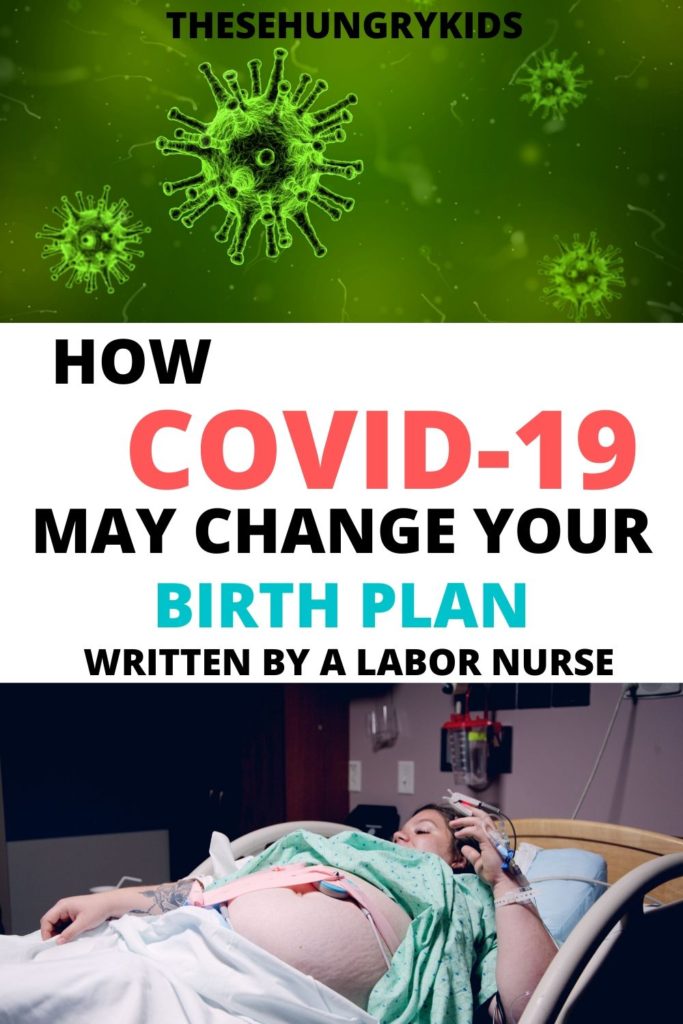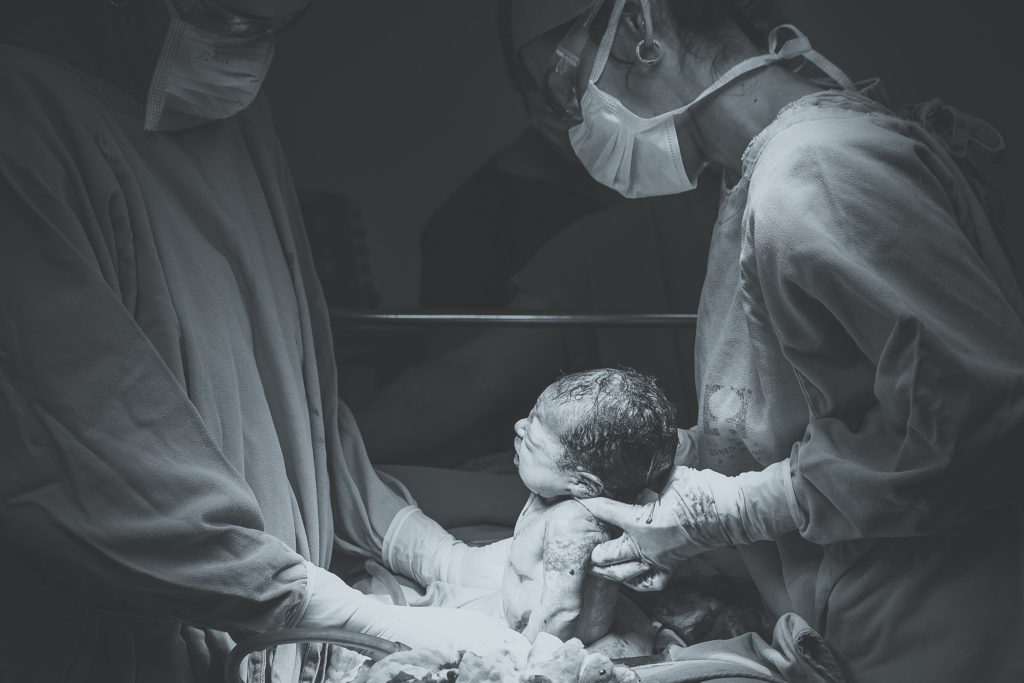The COVID-19 panedmic has changed many things about our culture. This post outlines how COVID-19 may affect your labor, delivery and birth and what you can do if you’re pregnant during the pandemic.
First off, let me say, I’m sorry your birth experience will be different than you imagined due to the COVID-19 pandemic.
My heart aches for you, and I know you didn’t imagine bringing your baby into a world of chaos and disease when you saw those two pink lines. Your pregnancy, labor and birth experience will be changed, and unfortunately not much can be done to fix that.
As a labor nurse, I try my very hardest to give every parent the birth they dream of. I will do my best to honor your birth plans amidst the uncertainties of labor. It’s always my goal to fulfill your dreams of the perfect birth.
I believe that my colleagues feel the same way…working in labor and delivery isn’t something you “fall” into. It’s a specialty that you choose to work in because you care. Please, please remember that when your nurse, doctor, midwife, tech, or other practitioner cannot give you everything you desire in your birth.
This pandemic has us healthcare professionals feeling scared, vulnerable, angry, and sad. We are showing up to work each and every shift knowing that we could be exposed and that we can carry the virus back to our families. We are trying to keep our heads above water, and are struggling as we know that eventually supplies will run out and we are not safe. In fact, this is happening all over the United States right now. In fact, some healthcare professionals are being instructed to use bandanas as protection (!!!!).
So please, be patient with us. We really, truly care. And we are deeply saddened that your experience will be different because of the coronavirus pandemic.
Please note that these are some things that may be different about your hospital stay, labor and delivery. Each hospital will vary, and much of this has to do with how infected your region is and how well prepared your facility is.
My mission is to prepare and inform, not advise. The information in this post is purely for entertainment and is not meant to replace the advice of a medical professional. I always adhere to HIPAA policies, any similarities to yours or anyone else’s story is purely coincidental. Information and opinions on this website does not represent any institution I am affiliated with. Please see my disclosure policy for more information. This post contains affiliate links, meaning I may earn a small commission at no additional cost to you if a purchase is made using the links. This helps fund this site, and keeps These Hungry Kids up and running. Thank you!

What you need to know about COVID-19 and pregnancy
According to this article from Yale Medicine, pregnant women are not known to be more likely to contract coronavirus, nor are they at greater risk for complications. It is not believed that it can pass to the fetus during pregnancy.
However, you can pass the illness to your infant after birth. The current Centers for Disease Control and Prevention (CDC) guidelines recommend temporarily separating parents with known COVID-19 infection from infants after birth. There is not great data to support this, so it should be an ongoing discussion with your provider. Using proper hand hygiene and a mask before touching the infant may be enough protection.
There is no data to support that it passes through breastmilk, so breastmilk remains the recommended nutrition for infants. If you are knowingly infected with COVID-19, it is recommended that you pump and give the infant a bottle versus breastfeeding.
Take a deep breath. That’s a lot of crappy information.
You can protect yourself by:
- Practicing social distancing
- Avoiding people that are sick
- Working from home, if possible
- Frequently washing your hands for at least 20 seconds, or use an alcohol based hand sanitizer
- Wearing a mask in public
- Avoid large gatherings
- Keeping guests in your home limited
How your birth plan may have to change due to coronavirus
Some things that you imagined would happen during your labor or hospital stay may have to change. This includes:
- You may be asked to stay in your room. If you had planned to walk the halls, you may not be allowed to do so. Instead, walk around your room, try different positions, or sit on a birth ball to keep active during labor. If walking was part of your pain management plan, you can instead walk around your room, or try any of the pain management strategies in this post.
- Meal trays may be standardized. Have you heard that your hospital serves the best bacon, or that the pepperoni pizza is amazing? Your hospital may have to stop serving individualized meal trays, and may need to serve the same meal throughout the hospital. This is because as staff gets exposed or sick, they will be out of work for a few weeks, leaving areas of the hospital short-staffed. Don’t worry – if you have any allergies or dietary restrictions, those should be honored.
- Change in visitor policy. This one hurts, y’all. If you planned to have several people in the room, that is probably not going to happen. Hospitals are instituting strict visitor policies. These suck, but they are intended to keep you, other patients, and staff safe.
Most hospitals I know are allowing one visitor per patient. In many cases that visitor is not allowed to leave the hospital once they arrive.
That means you will have to make arrangements for other children and pets for a few days if your partner is planning to stay. It also means that siblings won’t be allowed to visit in the hospital. It’s not what you may have imagined, I know. I loved having my husband and mom both there for my deliveries, and I’m sad that other moms won’t get the same experience. Your support person may benefit from reading this post to learn what their duties are on the big day.
Also, these visitor restrictions are changing across hospitals day by day and even sometimes hour by hour. So if you call on Tuesday and they say you can have visitors, but come Wednesday they say you can’t, it’s because the policies are changing constantly as the disease spreads and communities adapt.
- You may be encouraged to be discharged sooner. You don’t have to agree, but some hospitals may allow an earlier discharge. This is to open up beds for new patients, or to limit your exposure to healthcare staff. Discuss with your doctor if you do not feel ready for an early discharge – it may just be an option offered to you.
- You may not be allowed to schedule an elective induction. As hospital beds become scarce, elective procedures are cancelled across the board. This goes for inductions, too! The beds are going to be saved for those that are being medically induced, not people who are tired of being pregnant. As you may have read in my post about inductions, they can often take days and that’s also a lot of exposure to you as the patient.
- Staff will wear more protective equipment. This includes masks, gloves, goggles, and/or face shields. It may seem scary or impersonal, but we have to protect ourselves and our family. We may have several patients we are caring for, and the likelihood of exposure is high. Remember: we are people with families outside of our job at the hospital, and some of us care for immunocompromised family at home. We need to protect ourselves and others, too.
- If you hired a doula, they may not be able to come to your delivery. This depends on the hospital you are delivering at. For some, unless your doula is a paid employee of the hospital, they are counted as a visitor. Many doulas are accommodating this by either working with you before your delivery, offering coaching to the other support person, or by being available via video conferencing during labor.
- You may not be able to use nitrous oxide. Unfortunately, this is a pain management option that is not advised due to its aerosolizing capabilities. Good news is there are other ways to reduce pain in labor, and you can still receive an epidural if you want one.
How you can prepare for your birth amidst the outbreak
- Warn family members and loved ones of policy changes at the hospital. If your hospital has a visitor restriction in place, encourage family members to stay healthy and meet the baby in small gatherings at home. When visitors arrive at the hospital, they will be turned away.
- Stay current with updates from the place you will deliver at. Hospital websites are updating constantly, and may have more information than the staff at the front desk can offer. Check frequently, because as mentioned above, the rules are always changing.
- Practice social distancing and self-isolation. Keep yourself and your family free of germs. Those with a fever, cough, or sore throat are not welcome at hospitals, and should not be around you or your newborn. And no, it doesn’t matter if it’s your baby’s other parent or grandparent.
- Bring as little as possible to the hospital to prevent exposure. Pack only the essentials, and nothing more! Use the hospital nursing pillows and hospital breast pumps as they can be wiped down with strong disinfectant. That lowers your risk of bringing the virus home.
What you can do to help
It’s really easy…
- Be kind, patient, and understanding
- Honor hospital policies
- Wash your hands
- Avoid sick people
We are here to help you and support you. We understand that things are different than you had planned, and we know you wanted things to go differently. As healthcare providers, we are trying to navigate this pandemic just like you are. We are doing everything we know we can do to alleviate the strain this is causing.
Here is some additional information about pregnancy and breastfeeding during the coronavirus outbreak from the Centers for Disease Control and Prevention.
Stay healthy, stay positive, and love your baby!
Good luck, mamas. You can do this!



Great post. Thank you!
You’re welcome, Laura!
Ugh…hoping my hospital allows my husband to be in the delivery room! Thanks for the info
I hope so, too, Olivia! It would be really hard to get through without a support person. Either way, stay positive. You’ve got this!
This was an awesome post. Thank you!
I’m so glad you liked it! <3
Preparing to deliver my second baby (due next week)! Thanks for the information in this post. I’ve already told my husband we should just pack one bag for all three of us, I’m planning on bringing a Vera Bradley overnight bag which is washable and hoping we don’t end up having to stay more than a few nights! As a fellow nurse (who is feeling lucky to be out on maternity leave during this crazy time), thank you for what you do!
Girllllll good luck!! Yes – one bag for all of you! Also, bring all of your things in with you when you enter the building the first time! We’ve been having moms put their car seats into a large garbage bag to keep it clean, and then taking it out right before you put the baby in. A Vera Bradley bag is a *perfect* idea. Thank you for all that you do as a nurse as well! I wish you a speedy and safe delivery <3
Thank you for posting this. It’s been on my mind a lot lately, especially because I am due late May with my first. Kinda has been giving me anxiety if I am honest.
Ugh, I’m so sorry you’re going through this. It’s a lot to think about! Please always reach out if you need to talk <3 Good luck, Hailey!